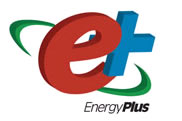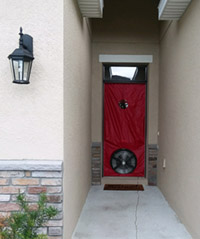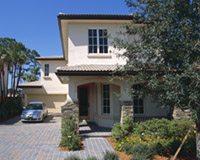FSEC’s Danny Parker Receives ACEEE Champion of Energy Efficiency in Buildings Award
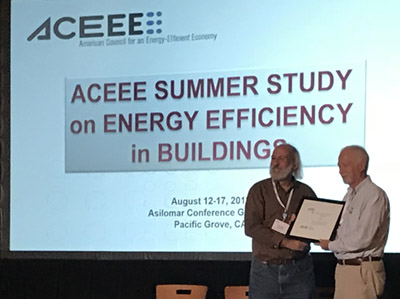
Danny Parker, right, recognized as ACEEE Champion of Energy Efficiency in Buildings.
|
The American Council for an Energy Efficient Economy (ACEEE) presented Danny Parker with the Champion of Energy Efficiency in Buildings Award at its 20th biennial Summer Study on Energy Efficiency in Buildings in August. Danny was recognized “for his systematic examination of building energy through more than 35 years of laboratory, field, and simulation studies and for his development of new home products and deep retrofits. His work is documented in more than 150 peer-reviewed papers and has received 2,500 citations.” Article
Danny Parker Featured in UCF Technology Transfer for Energy Saving Innovations.
More than 30 years ago, a college professor mocked Danny Parker’s plans for graduate school. “I told him that I want to study energy use in houses,” Parker said, and the professor retorted, “That’s crazy! There’s no such degree. You got really strange ideas.” Undeterred by the insults, Parker pursued his goals. His advice to students and would-be inventors: “Be willing to fail and laugh about it when things don’t work.”
Article
UCF selected for National Science Foundation Belmont Forum Collaborative Research Food-Water-Energy Nexus: Enabling adaptive integration of technology to enhance community resilience
The research team will develop a multi-scale modeling framework to address the inter-relationship between multiple stressors affecting the food-water-energy nexus in three urban environments: Amsterdam, Orlando, and Paris. FSEC’s Dr. Lixing Gu and Deputy Director Philip Fairey are two of five UCF research investigators for the project. Details
FSEC Researchers to Develop New Features and Support for Department of Energy's EnergyPlus Software
Dr. Lixing Gu, Rich Raustad and Dr. Bereket Nigusse were successful in winning new U.S. Department of Energy awards to continue to develop and support users of the Energy Department’s Energy Plus software. Link to EnergyPlus
FSEC to Evaluate Orlando Utilities Commission
Efficiency Programs
FSEC’s researchers were selected to evaluate and make recommendations on a number of the municipal utility's customer efficiency efforts by evaluating data from current programs, as well as estimating impact from new programs.
OUC Residential Programs OUC Business Programs
PUBLICATIONS
Potential of a Very High Efficiency Solar-Assisted Heat Pump Water Heater
Danny Parker, Carlos Colon Tim Merrigan, Jeff Maguire
Reducing energy use for heating hot water remains a major challenge around the world. This paper
describes a novel solar photovoltaic-assisted heat pump water heater, PV-HPWH, which achieved an 83% reduction (COP 5.4) in water heating energy compared with electric resistance.
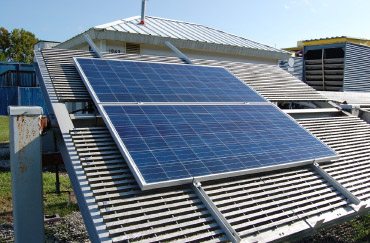
Photovoltaic panels used in assisted heat pump water heater testing at FSEC. |
Paper
Optimizing Energy Efficiency and Improved Dehumidification Performance of Variable Capacity Air Conditioning Systems
Charles R. Withers Jr.
Testing was conducted on two central variable capacity systems and one minisplit system, assessing energy savings relative to a fixed capacity system. Variable capacity systems with the highest rated efficiency showed significant energy savings, but the humidity control was worse than lower rated efficiency systems. This paper indicates why, and what can be done to improve humidity control of such high efficiency systems.
Predicted annual cool and dehumidifier energy for four equipment tests with supplemental dehumidification set at 60% RH, except minisplit, which had no supplemental dehumidifier.
| Test Configuration Annual |
Annual kWh |
Annual savings
kWh/yr |
Annual Savings |
Indoor ducted
SEER 13 FC |
4338 |
|
|
Indoor ducted
SEER 14 VC |
4109 |
229 |
5.3% |
Indoor ducted
SEER 22 |
3256 |
1082 |
24.9% |
| Ductless SEER 21.5 supplemental minisplit; economy mode |
3224 |
1114 |
25.7% |
Paper
Investigation of Energy Impacts of Ducted Dehumidifier Duct Configurations and Location
Charles R. Withers, Jr., Dr. Bereket Nigusse, Rob Vieira
FSEC staff experimentally evaluated the energy performance of three different dehumidifier configurations: Stand-alone dehumidifier, ducted to the return side of the central conditioning system, ducted to the supply side of the central system. The return-side location had the largest combined (cooling and dehumidification) energy use. FSEC also modeled the impact of locating ducted dehumidifiers in attics or garages.
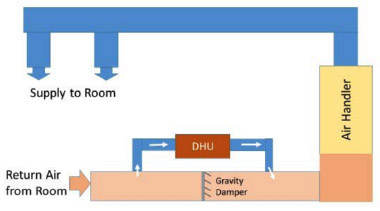
Conceptual illustration of DHU ducted to main central return duct. Gravity dampener only opens when central system on. When closed, it blocks short circuiting of DHU supply air straight back into DHU return. |
Report
Residential Air Leakage Testing and Mechanical Ventilation Verification
Jeffrey K. Sonne
FSEC evaluated how contractors, testers and building departments were handling the requirement for tested air leakage limits. The document review for the 15 tested study homes shows that air leakage forms were available from six of the 10 jurisdictions involved, with forms not being available from three jurisdictions, and the form from one other jurisdiction pending. The average industry tested ACH50 leakage (median 4.0) for the study sample was very close to the average FSEC-tested ACH50 (median 4.3), but two of the nine ACH50 values differed by 1.5, and one by 2.0 ACH50. All industry and FSEC test results are below the code’s maximum ACH50 of 7.0. Test forms that were received were shown to have code qualified testers providing the tests. Report
Analysis of Differences between 2018 IECC R406 Code Compliance and ANSI/RESNET/ICC Standard 301
Philip Fairey, Robin Vieira
EnergyGauge USA was used to study outdoor air ventilation rates in energy-efficient, one-story 2000 ft2, 3-bedroom, single-family homes in 16 representative U.S. cities. Each of the 16 home archetypes was configured to be minimally compliant with the score requirements of Table R406.4 of the 2018 IECC as determined in accordance with ANSI/RESNET/ICC 301-2014. Each home is also configured to comply using two different compliance methods: the first with only high-efficiency options and the second utilizing on-site photovoltaic power generation.
Each home configuration is evaluated using the ANSI/RESNET/ICC 301 Reference Home
ventilation specification and again using the 2018 IECC R406.3 Reference Home ventilation specification. The principle finding from the study is that use of the 2018 IECC R406.3 specification for Reference Home ventilation increases the homes’ index scores between 2.4 and 9.0 points compared with the index score of ANSI/RESNET/ICC 301-2014. The index score increase is found to be strongly dependent on weather conditions with homes in cold climates experiencing much larger increases than homes in warm climates.
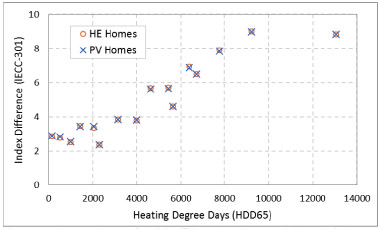
Index score increase for High Efficiency (HE) homes and Photovoltaic (PV) homes due to 2018 IECC R406.3 Reference Home ventilation specification. |
Report
Comparison of the 6th Edition Florida Building Energy Conservation Code with IECC 2018 & ASHRAE 90.1-2016
Jeffrey Sonne, Bereket Nigusse, Muthusamy Swami and
Robin Vieira
This study provides a comparison between the 6th Edition (2017) Florida Building Code, Energy Conservation (referred to here as the Florida Energy Code or FEC) and 2018 International Energy Conservation Code (IECC), based on approved 2015 to 2018 IECC changes included in the International Code Council’s Complete Revision History to the 2018 I-Codes document. Report
Course Spotlight
Florida Green Home Certification Training
October 23-24, 2018
Take this course and learn green building techniques appropriate for Florida homes, and become one step closer to becoming an accredited Certifying Agent of the Florida Green Building Coalition (FGBC).
Register now! |


